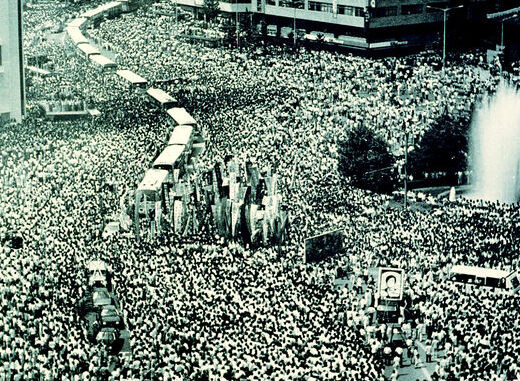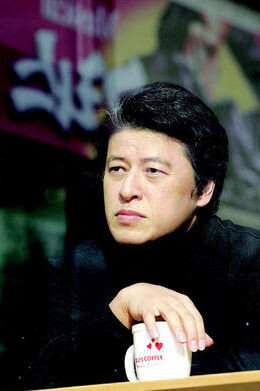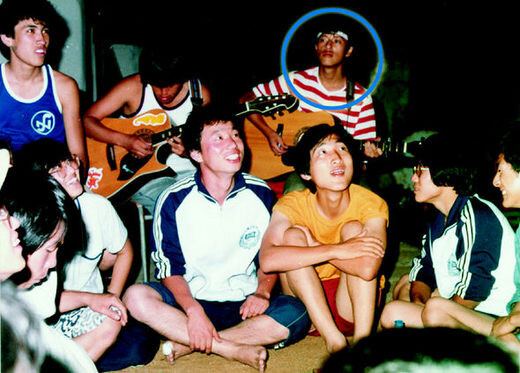hankyoreh
Links to other country sites 다른 나라 사이트 링크
[Feature] An actor turned activist, later in life

Here is the second story of 386 generation.
"I served as a ambassador at large for both the Unite our People Movement Headquarters and the Abolish the Family Registry and Create Family Equality Organization, as well as a member of the Cultural Alliance for Peace at Daechuri and supporter of the Minkahyup Human Rights Group, not to mention as a moderator and leader for countless assemblies and protests."
These are the words of Kwon Hae-hyo, better known to most Koreans as an actor. Outside of films and plays, he is an "activist who lives by the people’s rhythm," as he describes it. Yet why did it take some ten years from his college days for him to take up a central role in various social movements?
Of his college days, Kwon says that "it was a time when I would try to decide which path to school would be free from tear gas, and brag about my well sought-out route to my friends...It was a time when I lacked the courage to throw rocks."

When he entered college in 1985, student government had finally started to find its voice. Since Park Chung-Hee’s Yusin Constitution of 1972, which ensured his grip on power, student government on Korea’s campuses was called "Hakdohogukdan," and was designed as a quasi-military "defense brigade." Park’s dictatorial government forced every college to form this kind of organization, and student heads were not elected but appointed by college authorities. Many students staged mounting protests demanding that the system be abolished and student government be granted autonomy. An independent student government organization was finally born in 1985.
There was not a day in Kwon Hae-hyo’s student days when the campus was free from the stench of tear gas. Yet to him, the smoke released by those lacrimatory shells was not so much a symbol of tyrannical oppression as merely a smell, pungent to the nostrils. His head buried in his books, he had no time to show up at the speeches of incensed students, which often stretched late into the night. After his father hit mandatory retirement age, Kwon had little choice but to sit in the front row of the classroom and aim for eye contact with the professor in the hopes of getting the grades necessary to receive a scholarship.
In 1986, he began his military service. "Of all my years, 1987 is the one I least remember," he said. "At the beginning of the year I participated in the Team Spirit training exercises," a large-scale joint exercise between Korean and U.S. troops. "We received our military indoctrination after the Chun Doo-hwan government rejected popular demands for direct elections, and starting in May, we received riot subjugation training."
"We would go into the mountains, cut down trees a meter in circumference, a meter-long tree boil the wood in water, mold it into a baton, and then conduct drills under the blazing sun. It was so tiring that some of the boys just started saying ‘enough with the drilling, let’s get on with the suppressing.’ "
But in September 1987, under popular pressure, President Chun turned on his heel and accepted the introduction of direct elections. The plan to keep troops deployed to clamp down on demonstrations was cancelled.
When Kwon returned to school in 1989, he turned down entreaties from his classmates to join them in protest, offering only words of encouragement instead. As always, he was devoted to his classwork, sleeping no more than four hours a night. It was thanks to these efforts that he took to the stage even before graduation.
"I started out thinking very lightly in regard to social issues," he said. "One day, a film director Byun Yong-Joo said to me ’buddy, why don’t you check out the one-day mock prison protest that the Minkahyup [Human Rights Group] are putting on?’ To this I assented happily, imagining a day spent snoozing in a cell."
The prison day experience was hosted in the Myeongdong district of Seoul. Though he had pictured a relaxing day, his experience differed considerably. Quite the opposite, the mock prison guard would even not let him lie down, calling him out of his cell to undergo group disciplinary sessions along with his "prison mates." Women cried and pleaded. The movie critic in the next cell over, Jeong Seong-il, began yelling, "Abolish the National Security Law!" Kwon wondered whether he, too, was supposed to get into the act, but he decided against it. Afterwards, though, he resolved to participate in more of these types of events, which opened the public’s eyes to such inhumane political and legal conditions.

"As someone who attended university in the 80s, I began to feel as if I were indebted. The sense of obligation, after all, tends to take effect on those who studied rather than protested during the 1980s. I’m saying this as one who was empathetic but didn’t take concrete actions."
Most of his friends had involved themselves in the student movement. One was involved with the attempted arson of the United States Cultural Center in 1986, and another was injured in the midst of a protest. Kwon still regrets not having visited his wounded friend in the hospital.
Kwon became a regular at Minkahyup’s "Human Rights Concert," and involved himself in many movements, including those to abolish the family registry system, or hojuje, which denied property rights and child custody to female divorcees and widows. The system was finally abolished in 2005.
Kwon also works to protect wild animals, and to improve the rights of the disabled as well as migrant workers. He has made something of a name for himself as a moderator for various assemblies. Since the fall of 2001, he went beyond presiding over group meetings and has earnestly taken up the role of high-profile activist.
"I read the books written by Professor Kang Chun-man and Kim Gyu-hang," he said, works which criticized the coverage of the Chosun Ilbo as too conservative. "After receiving a timely phone call, I decided to join the "Anti-Chosun Movement." As I was the sole actor involved in the group, there was no end to the interviews, and many student governments invited me to speak. It was then that I thought to myself, ’Shouldn’t I take responsibility? Isn’t it okay to speak up now?’ In truth, until that time, I had never dropped my affiliation as an actor to speak up as Kwon Hae-hyo, the individual."
From that time, he has jumped at every chance to give speeches to schools and various organizations. After 10 years of service to Minkahyup, he now ranks among the "veteran activists."
"I can’t deny that my activities are made possible by my wealth," he admits. "But I cannot agree with the statement that those without wealth are exempt."
He is this serious about his activities. To him, endurance is among the most valuable traits of activism. With the dawning of the New Year, he is ready to tackle new problems.
"Having visiting some classrooms studying the subject of culture, I’ve noticed a significant necessity for improvement. This year, I hope to create a culture and arts organization for children. I suppose my schedule may fill up because of this."
It would seem that the wind is sometimes stronger in late spring rather than at spring’s start.
By Lee Jeong-hun
Translated by Daniel Rakove
Please direct questions or comments to [englishhani@hani.co.kr]
Editorial・opinion
![[Column] Has Korea, too, crossed the Rubicon on China? [Column] Has Korea, too, crossed the Rubicon on China?](https://flexible.img.hani.co.kr/flexible/normal/500/300/imgdb/original/2024/0419/9317135153409185.jpg) [Column] Has Korea, too, crossed the Rubicon on China?
[Column] Has Korea, too, crossed the Rubicon on China?![[Correspondent’s column] In Japan’s alliance with US, echoes of its past alliances with UK [Correspondent’s column] In Japan’s alliance with US, echoes of its past alliances with UK](https://flexible.img.hani.co.kr/flexible/normal/500/300/imgdb/original/2024/0419/2317135166563519.jpg) [Correspondent’s column] In Japan’s alliance with US, echoes of its past alliances with UK
[Correspondent’s column] In Japan’s alliance with US, echoes of its past alliances with UK- [Editorial] Does Yoon think the Korean public is wrong?
- [Editorial] As it bolsters its alliance with US, Japan must be accountable for past
- [Guest essay] Amending the Constitution is Yoon’s key to leaving office in public’s good graces
- [Editorial] 10 years on, lessons of Sewol tragedy must never be forgotten
- [Column] A death blow to Korea’s prosecutor politics
- [Correspondent’s column] The US and the end of Japanese pacifism
- [Guest essay] How Korea turned its trainee doctors into monsters
- [Guest essay] As someone who helped forge Seoul-Moscow ties, their status today troubles me
Most viewed articles
- 1[Column] The clock is ticking for Korea’s first lady
- 2After 2 months of delayed, denied medical care, Koreans worry worst may be yet to come
- 3Samsung barricades office as unionized workers strike for better conditions
- 4[Column] Has Korea, too, crossed the Rubicon on China?
- 5[Correspondent’s column] In Japan’s alliance with US, echoes of its past alliances with UK
- 6Hong Se-hwa, voice for tolerance whose memoir of exile touched a chord, dies at 76
- 7All eyes on Xiaomi after it pulls off EV that Apple couldn’t
- 8US overtakes China as Korea’s top export market, prompting trade sanction jitters
- 9[Editorial] When the choice is kids or career, Korea will never overcome birth rate woes
- 10[Photo] Smile ambassador, you’re on camera